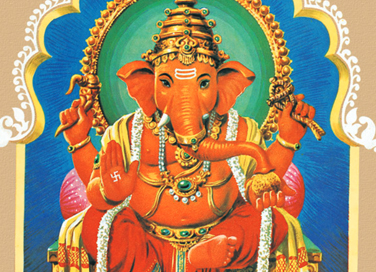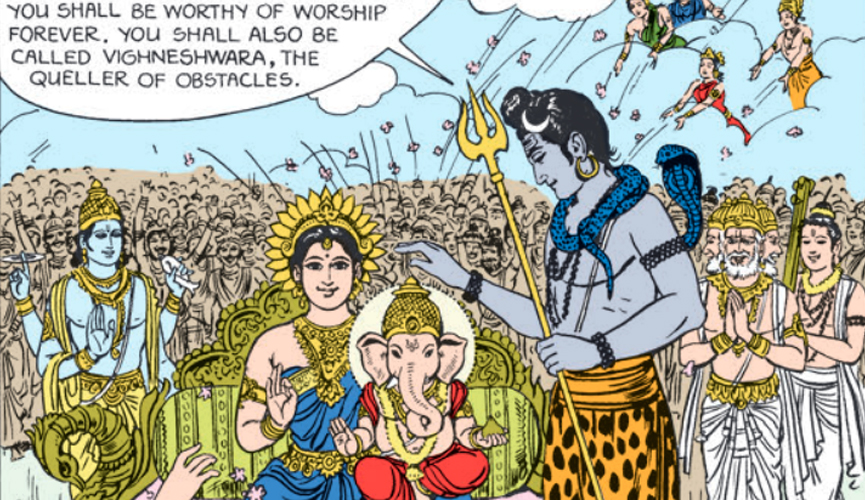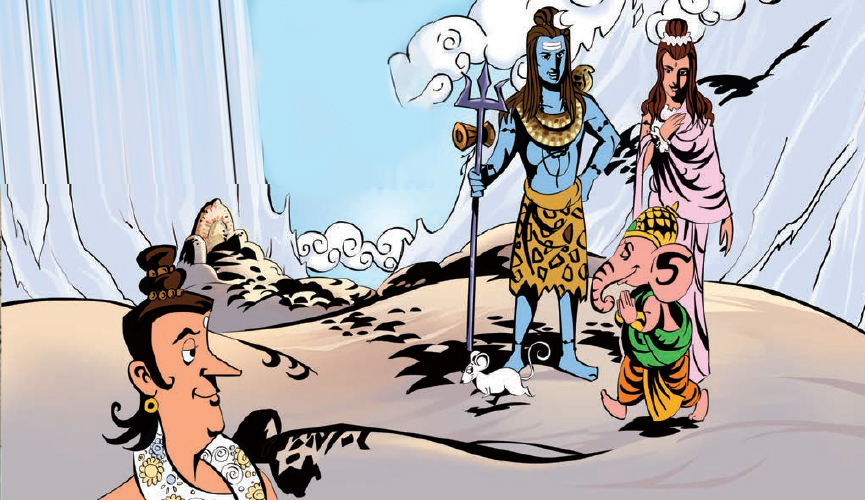The God of Auspicious Beginnings
- June 5, 2020


The God of Auspicious Beginnings
- June 5, 2020
Premium
If you are have taken part in Hindu rituals and prayers, you would have noticed that, on every occasion, the first offering is made to the adorable elephant god, Ganesha. He is remembered before the commencement of any new venture or ritual. Ganesha is regarded as the god of auspicious beginnings. But do you know why Ganesha is always the first god that offerings are made to? There is not one but two reasons for this.
One day, before Parvati goes in for a bath, she posts Shiva’s attendant, Nandi, at the door, instructing him to not let anyone enter. However, when Shiva comes along, Nandi doesn’t stop him, wondering how she can stop someone from entering his own home. Furious, Parvati decides to create an attendant who is loyal only to her. From the saffron paste of her body, she moulds a boy and blesses him with life. She is so overwhelmed by her creation, she sees the boy as her own son.
Later, Parvati orders her son to not let anybody into the palace while is she having a bath. When Shiva shows up, the boy stops the god from entering, true to his mother’s word. Shiva, enraged by the boy’s actions, wages a full-blown war with the boy, eventually cutting off his head. When Parvati learns this, she is inconsolable. She orders Shiva to bring her child back to life, threatening the future of all the three worlds otherwise. As per Brahma’s advice, Shiva sends his armies northwards, telling them to bring back the head of the first creature they see. Accordingly, the head of an elephant is brought back, which he places on the boy’s neck. Lord Brahma blesses him with life, and names him Ganesha. Ganesha is then blessed with many weapons and powers. It is at this time that Shiva proclaims Ganesha as the lord of new beginnings, with the power to remove all obstacles from the path of success.
To receive more such stories in your Inbox & WhatsApp, Please share your Email and Mobile number.

One day, when a group of holy men were conducting a puja, each god started boasting as to who the offering would be made to first. Soon it turned into an ugly argument.
With the debate reaching a deadlock, Narada intervenes and asks the gods to seek Shiva’s help. Shiva decides to determine the most important god through a celestial race. The quickest to finish three full rounds of the world would be the winner and thus, gain authority over every offering ever.
All the gods start off in a tearing hurry to complete the race. Meanwhile, Ganesha is busy devouring laddus. When his mother Parvati asks him the reason for his absence from the race, Ganesha smiles and said he is yet to begin. The other gods finish one round and start on the second, while Ganesha continues to eat laddus. As the other gods head out on the third round, Ganesha walks to where Shiva and Parvati are seated, folds his hands, and takes not three but seven rounds of his parents.

When asked to explain his actions, Ganesha replies that his parents are not just his world but his entire universe! Pleased by his wit and admiration, Shiva declares him the winner, and the other gods have no choice but to bow down to the elephant god’s quick thinking!
So the next time you offer laddus to tubby Ganesha, do whisper in his ears that you know the reason why he is always first!
To receive more such stories in your Inbox & WhatsApp, Please share your Email and Mobile number.

Comic of The Month
The Naval Journey of India Book I
This book is the first of a three-book series that takes a deep and detailed look at India's Naval History and a deep insight into the lives of our men and women in white. But any series on the Indian Navy has to start at the very beginning - exploring India's celebrated maritime history. Join our little hero, Bharat, and his grandfather, Commodore Sagar, as they sail into the deep blue waters of time. Book I of The Naval Journey of India takes a sweeping look at India's maritime endeavours, how the seas impacted us over millennia and how the oceans made us who we are.